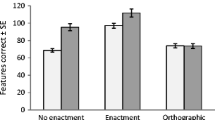Summary
Subjects enacted two series of tasks as instructed (subject-performed tasks, or SPTs). The enactions were of either short (5-s) or long (30-s) duration. The long en actions were either repetitive (e.g.,bounce a ball several times) or else nonrepetitive (e. g.,stand up, walk round the room, open the door, look out, close the door, sit down). During presentation, subjects were to rate the probability of recall of each SPT in a subsequent free-recall test. The long SPTs were given higher recall ratings than the short SPTs, but the subjects did not differentiate between the repetitive and the nonrepetitive items. Recall mirrored the ratings; the long SPTs were recalled more frequently than the short ones, with no difference between the repetitive and the nonrepetitive items. The metamemory results are discussed in relation to the notion that the memory-monitoring system is sensitive to quantitative, but not to qualitative, differences in encoding.
Similar content being viewed by others
References
Baddeley, A. D., Thomson, N., & Buchanan, M. (1975). Word length and the structure of short-term memory.Journal of Verbal Learning and Verbal Behavior, 14,575–589.
Cohen, R. L. (1983). The effect of encoding variables on the free recall of words and action events.Memory & Cognition, 11, 575–582.
Cohen, R. L. (1988). Metamemory for words and enacted instructions: Predicting which items will be recalled.Memory & Cognition, 16, 452–460.
Cohen, R. L., Sandler, S. P., & Keglevich, L. (1991). The failure of memory monitoring in a free recall task.Canadian Journal of Psychology, in press.
Craik, F. I. M. (1968). Two components in free recall.Journal of Verbal Learning and Verbal Behavior, 7, 996–1004.
Craik, F. I. M., & Tulving, E. (1975). Depth of processing and the retention of words in episodic memory.Journal of Experimental Psychology: General, 104, 268–294.
Glanzer, M., & Razel, M. (1974). The size of the unit in short-term storage.Journal of Verbal Learning and Verbal Behavior, 13, 114–131.
Helstrup, T. (1987). One, two, or three memories? A problem-solving approach to memory for performed acts.Acta Psychologica, 66, 37–68.
Kausler, D. H., & Lichty, W. (1988). Memory for activities: Rehearsalindependence and aging. In M. L. Howe & C. J. Brainerd (Eds.),Cognitive development in adulthood (pp. 93–131). New York, Berlin, Heidelberg: Springer.
Kausler, D. H., Lichty, W., Hakami, M., & Freund, J. (1986). Activity duration and adult age differences in memory for activity performance.Psychology and Aging, 1, 80–81.
Naveh-Benjamin, M., & Jonides, J. (1984). Maintenance rehearsal: A two component analysis.Journal of Experimental Psychology: Learning, Memory, and Cognition, 10, 369–385.
Nilsson, L. G., & Cohen, R. L. (1988). Enrichment and generation in the recall of enacted and non-enacted instructions. In M. M. Gruneberg, P. E. Morris, & R. N. Sykes (Eds.),Practical aspects of memory: current research and issues (Vol. 1, pp. 427–432). Toronto: John Wiley & Sons.
Norris, M. P., & West, R. L. (1989). Why do older adults recall performed actions as well as younger adults. Paper presented at the First International Conference on Memory for Action Events, at Glendon College, Toronto, Canada, July.
Rabinowitz, J. C., Ackerman, B. P., Craik, F. I. M., & Hinchley, J. L. (1982). Aging and metamemory: The roles of relatedness and imagery.Journal of Gerontology, 37, 688–695.
Shaw, R. J. & Craik, F. I. M. (1989). Age differences in predictions and performance on a cued recall task.Psychology and Aging, 4, 131–135.
Zechmeister, E. B., & Shaughnessy, J. J. (1980). When you know that you know and when you think that you know but you don't.Bulletin of the Psychonomic Society, 15, 41–44.
Zimmer, H. D. (1986). The memory trace of semantic or motor processing. In F. Klix & H. Hagendorf (Eds.),Human memory and cognitive capabilities: Mechanisms and performances. (pp. 215–223). Amsterdam: North-Holland.
Author information
Authors and Affiliations
Rights and permissions
About this article
Cite this article
Cohen, R.L., Bryant, S. The role of duration in memory and metamemory of enacted instructions (SPTs). Psychol. Res 53, 183–187 (1991). https://doi.org/10.1007/BF00941385
Issue Date:
DOI: https://doi.org/10.1007/BF00941385




